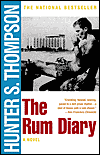(Book review: The Rum Diary by Hunter S. Thompson, 1998, ISBN-13: 978-0-684-85647-6)
Though Hunter S. Thompson went on to become known as the “Doctor of Gonzo Journalism” as his career went on, he had aspired to be a novelist in the high American style of F. Scott Fitzgerald and Henry Miller. While in Puerto Rico in the late 1950s and for years afterward (culminating in publication in 1998, seven years before the he died) Thompson worked on a novel that he sold the rights to in the 1960s in one of the contracts and deals that went with being a freelance writer. For various reasons it was never published (except in excerpts), and with whatever edits happened over the years (in a letter talking about the Rum Diary he pointed out that he might change the story from a perspective of greater maturity) the novel still comes pretty directly from the aspiring journalist who had come down to Puerto Rico for some sun after a year as a copyboy for Time magazine in New York fresh from a tour in the Air Force.
The Thompson of the novel (the protagonist, Paul Kemp) is an old-school American young man trying to make it in the postwar boom. Editing a newspaper story about why Puerto Ricans are leaving for New York, Kemp imagines a reporter asking him why he left home:
“I get the fear…can you use that? St. Louis Gives Young Men the Fear–not a bad healine, eh? [p.60]”
The story centers on the time Kemp is employed at an English-language newspaper in San Juan. He associates with other exiles and experiences the dramatic ups and downs of island living. As he notes in the first chapter:
“There was no reason to feel pressure, but I felt it anyway—the pressure of hot air and passing time, an idle tension that builds up in places where men sweat twenty-four hours a day. [p.23]”
Kemp is a few years older than Thompson was while in Puerto Rico, and the question arises about how much the character Yeamon (who is from Kentucky, after all) is also based on the author himself:
“He [Yeamon] looked up. ‘You know—I’m a rebel, I took off—now where’s my reward?’
‘You fool,’ I [Kemp] said. ‘There is no reward and there never was.’
‘Jesus,’ he said. ‘That’s horrible.’ He raised the bottle to his lips and finished it off. ‘We’re just drunkards,’ he said, ‘helpless drunkards…’[p.109]”
Yeamon has a girlfriend named Chenault that accompanies the two of them to a wild holiday in St. Thomas. At a house party they end up at, they lose track of her and end up confronting a hostile after-party situation and are beaten up and driven away.
They can’t even find her the next day, but then Chenault later returns to San Juan, but to Kemp’s place and not Yeamon’s, before leaving to go back to Connecticut.
Working on a tourist brochure to make extra money, Kemp meets an ex-Marine named Martin who has gone native in a way he probably never could:
“‘Yeah, I grew up in Norfolk, but I don’t remember it much—seems too long ago.’ [p.130]’”
Zimburger, a friend of Martin, reflects on how langosta don’t even have claws the way lobsters do:
“‘Old God sure was in a good mood when he made this place.’ [p.131]”
However, when Kemp runs into bland American tourists he can’t control his contempt:
“These people should be kept at home, I thought; lock them in the basement of some goddamn Elks Club and keep them pacified with erotic movies; if they want a vacation, show them a foreign art film; and if they still aren’t satisfied, send them into the wilderness and run them with vicious dogs. [p.96]”
Skepticism about being down there haunts Kemp, whether he is thinking about Europe or Mexico or questioning what his colleague Sanderson made of the island:
“He got very excited when he talked about all things happening in Puerto Rico, but I was never sure how much of his talk he believed. [p.49]”
Some of the things happening there for Kemp include a beating by cops after he and Yeamon and their friend Sala fled a dispute over being able to get dinner at a bar, and then being lucky to be bailed out of the filthy, threatening prison.
Without having resolved the resisting arrest charges incurred in the incident they were arrested for, the already-fired Yeamon plunges further into trouble after the paper collapses by participating in a deadly attack on the paper’s former owner, Lotterman:
“I saw Lotterman’s face collapse with surprise, and he was standing straight as a wooden pole when Yeamon hit him in the eyes and knocked him about six feet. He staggered wildly for a moment, then collapsed on the grass, bleeding from his eyes and both ears. Then, out of the corner of my eye, I saw a dark shape come hurtling across the garden and strike the group like a cannonball. They all went down, but Donovan was first on his feet. He had a berserk grin on his face as he grabbed one man by the head and mashed him sideways against a tree. Yeamon dragged Lotterman out from under another man and began whacking him around the garden like a punching bag. [p.198]”
Kemp ends the novel soon after, safe in the knowledge that of flight “on the morning plane.” Reflecting to music on the patio of Al’s, Kemp reflects as the novel closes with Thompson’s salute to Scott Fitzgerald:
“Sounds of a San Juan night, drifting across the city through layers of humid air; sounds of life and movement; people getting ready and people giving up, the sound of hope and the sound of hanging on, and behind them all, the quiet, deadly ticking of a thousand hungry clocks, the lonely sound of time passing in the long Caribbean night. [p.204]”


3 thoughts on “Hunter S. Thompson’s take on island living”